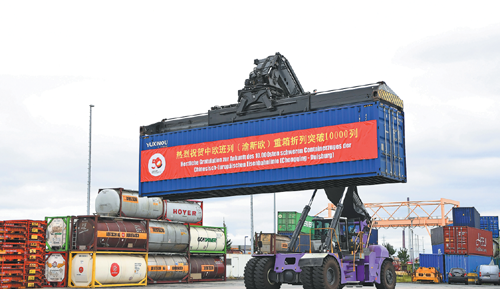Stronger supply chains can help China address West's de-risking
By John Gong | China Daily | Updated: 2023-06-28 06:31

Ever since European Commission President Ursula von der Leyen coined the phrase "de-risking" from China to describe a key element of the European Union's China policy, the United States has been parroting it as a convenient means to cover what appears to be its "decoupling" China policy. But what exactly are the risks of expanding trade with China that some Western economies have been playing up?
Given that China's trade in goods with the EU is worth nearly $850 billion and the US about $750 billion, there are three types of risks that the Western economies are talking about. The first is too much dependence on China, because Western economies buy a high percentage of their goods for certain industries and sectors from China, which they say could be a very risky affair. This is essentially a diversity argument.
The second type of risk is critical dependence on China for goods related to national security. This could be dangerous if they are majorly controlled by China, which is not viewed as a friendly or ideologically like-minded country by some Western powers. Examples include critical medical supplies as seen during the COVID-19 pandemic, and materials tangentially related to the defense supply chains. This argument combines national security, geopolitics and a bit of ideology based on so-called liberal democracy.
The third type of risk is regarding exports and transfers of critical high-tech to China, some perhaps meant for defense applications. The Western powers see this as a risk because they want to maintain a comfortable lead over China in the high-tech sector.
China cannot control the West's export or transfer of high-tech, but on the import side, it can offer an argument that debunks the de-risking necessity. And the best argument was put forth by Premier Li Qiang during his recent trip to Germany, where he said: "Enterprises have the most direct and acute sense of risks and they know how to avoid and handle them. So, enterprises should be given back the leadership role in preventing risks."
The fact that many foreign companies, including a lot of German companies, continue to operate and invest in China speaks volumes about the resilience and reliability of the supply chains in the country. China's infrastructure, measured by any standard, is world-class, and so is its logistics network. And Chinese workers are among the best in terms of productivity and ingenuity.
More important, the Chinese government has the will and the means to mobilize whole-of-society resources to ensure the smooth running of supply chains, as was evident during the pandemic, when many local governments went out of their way to help foreign companies operating in China to resume economic activity, and export-oriented companies to resume trade.
In addition, there is no such thing as one-way dependence in a two-way trade. Trade has two parties, a buyer and a seller, both of whom gain something from the exchange. The seller is as dependent on the buyer as the buyer is on the seller. So talking or making efforts to eliminate the first type of risk based on the diversity argument is simply chicanery.
Still, Premier Li's powerful argument could fall on deaf ears when it comes to the second type of risk, not least because Washington has adulterated the concept of national security. The US' national security has expanded to include so many things that it has become like the Star-Spangled-Banner on American people's front lawns on Veterans Day.
Besides, despite trade agreements giving a fairly narrow interpretation of national security exemption for member states when it comes to their obligation to the World Trade Organization, the US continues to bring new items under the national security banner.
In short, there are certain things that China can do to de-risk the Western economies' "de-risking". Since in terms of geopolitics, ideology and national security, it is hard to change the mindset of the Cold War-obsessed Western powers, China should do its best to ensure its supply chains continue to be the most reliable in the world.
The author is a professor at the University of International Business and Economics and VP — research and strategy at the UIBE-Israel.
The views don't necessarily reflect those of China Daily.
If you have a specific expertise, or would like to share your thought about our stories, then send us your writings at opinion@chinadaily.com.cn, and comment@chinadaily.com.cn.
























